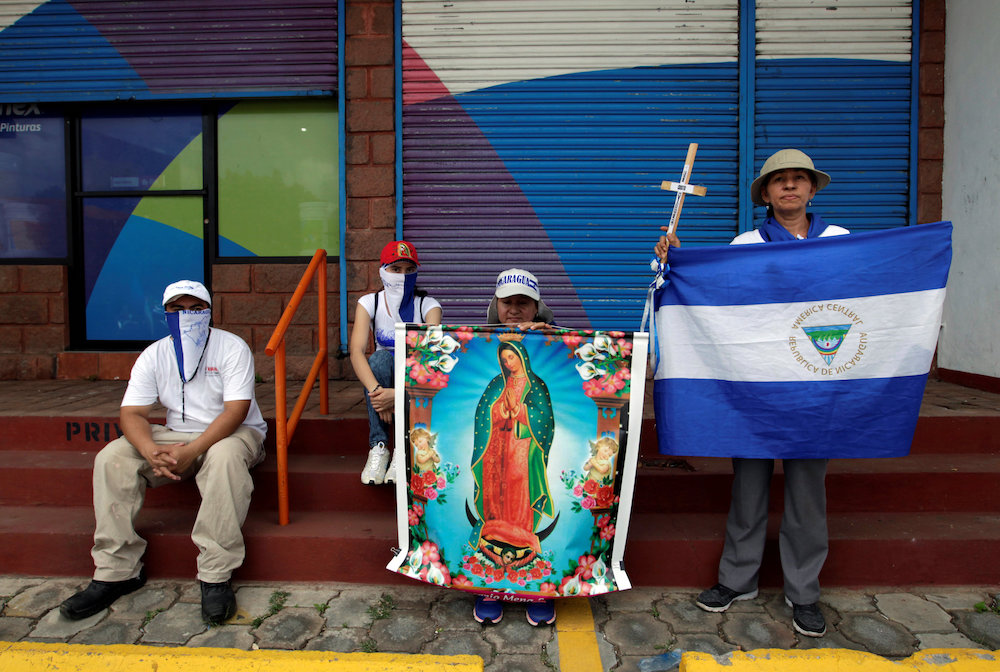NICARAGUA — In October, the government of Daniel Ortega and his wife, Vice President Rosario Murillo, imposed a sweeping ban on civil protest in Nicaragua, including carrying the national flag or inflating blue and white balloons.
Critics see the crackdown as an effort to snuff out a spontaneous protest movement that almost brought them down earlier this year.
Those in favor of Ortega, who’s on his third consecutive presidential mandate, see it as the government trying to lead the country back to peace after protests that began in April in response to a proposed social security reform that would have hurt the working class and the elderly.
The Catholic Church was literally caught in the middle, with Ortega asking the bishops’ conference to mediate in a dialogue effort that was held in the interdiocesan national seminary of Our Lady of Fátima, located in Managua. Due to disruption caused by the dialogue, classes were suspended and every diocese forced to improvise a study center for future priests.
At times, the Church’s signals have seemed mixed — Cardinal Leopoldo Brenes at one point asked people to stop using the Managua Cathedral as a protest base, while Msgr. Miguel Mantica, a parish priest in Managua, has called on those same people not to be “paralyzed by fear.”
“I’ve been accused of leading a coup. The dictionary defines a coup leader as someone who brings down a government to take power for himself. Well, I’m not interested in power, so I can’t be a coup leader!” Brenes said November 17.
Brenes is a man who can’t disguise his concern for Nicaragua, a country that’s seen enough revolutions to know that lofty ideas to convince the masses sooner or later end up shipwrecked by abuses of the few in power, their families, and some of their closest friends.

“Injustice in Nicaragua is centuries old; there has been an inability to dialogue, to recognize the other. We always go back to this deathly cycle of violence, of crushing one another, to make my word count and ignore that of others,” Mantica, who leads St. Francis of Assisi Church in Managua, told a local newspaper.
In a nutshell, eight of the country’s 10 bishops interviewed during a November 16-28 visit to Nicaragua agree that dialogue is the only way forward.
Asked about the cause of the current crisis, which has left an estimated 500 protesters dead and an even larger number in prison or “disappeared,” most observers say the bill proposed in April was just the match that lit a fire building for years, with the Ortega regime steadily amassing control over all four traditional powers — executive, judiciary, congress, and the military.
Opposition is virtually nonexistent, with those who might have the potential of succeeding Ortega either lacking the social base to be elected or the safety to actually run for the presidency.
The Church’s role at the center of the crisis, with priests literally placing themselves between the army, police, paramilitary forces and students protesting the regime, has led to a division among some of the faithful.
Many Catholic churches, including the Managua Cathedral, were opened to the young protesters during some of the worst of the clashes, as well as medical attention, since public hospitals had received orders to let the wounded die upon arrival.
Those who are pro-government argue the bishops and priests should preach to them, too.
“Veronica,” who agreed to talk only if her identity was protected because the regime didn’t give her the green light, said that she supports Ortega because, “I see the trajectory of progress his governments have provided to the country since 2006.
“Don Daniel has implemented many social projects that favor the poor,” Veronica said. “They’ve implemented many projects related to family economy, giving people chickens, pigs, and a cow. They’ve helped a lot to reduce the poverty levels in the rural areas.”
Within the flock, there are even radicalized pro-Ortega Catholics who shifted from being Mass-going faithful to people who stop the bishops on the street to accuse them of terrorism.
One of the bishops who’s been at the forefront is Bishop Silvio Jose Baez, appointed as auxiliary of Managua nine years ago, and who’s entire family has had to flee the country due to his outspokenness both in traditional media and through his Twitter account.
“I have nothing to hide … all I’ve done is serve the people in the name of God, and I will continue in this role that the Church has entrusted to me,” he said, speaking at his residence in the diocesan seminary. “My conscience is clean, I have nothing to hide, and I’m innocent of everything I’m being accused of.”
The reference is to voice recordings of Baez allegedly calling for a coup. The tape was procured during a private conversation with five peasants, then altered and released in an attempt to discredit him. Afterward, a petition demanding his removal began to circulate and public employees are being forced to sign it or face being fired from their jobs.
According to Baez, the “narrative from the state” of a failed coup financed by foreign interests is “all a lie.”
“This was a pacific and citizen-led insurrection that caught us all by surprise, because it began from where we least expected it, young people,” he said, acknowledging that until April, many older Nicaraguans saw young people invested only in watching soccer.
“But they’ve woken the conscience of the country,” he said.
Inés San Martín is the Rome bureau chief for Crux, a partner of Angelus.

